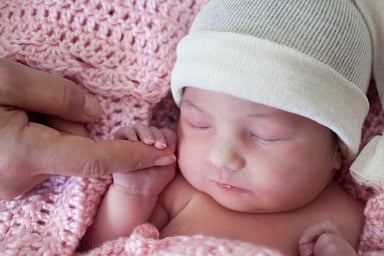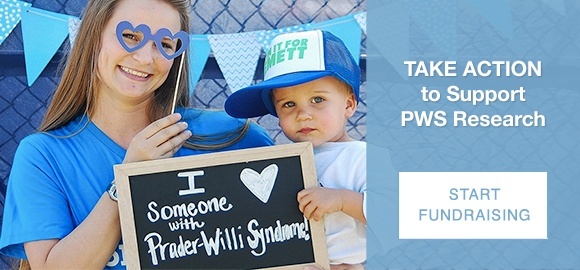A special contribution by guest blogger Jeannine Kowal, FPWR Board President
Share your story via our Stories of Hope Questionnaire.

Caitlin's birth was uneventful. Caitlin's birth was induced at thirty‑nine and a half weeks because of growth concerns. Her Apgar score was 8/9, and we were discharged from the hospital two days later. We noticed that she was very sleepy, and we had a hard time feeding her, but the hospital pediatrician reassured us that newborns occasionally need a few days to "wake up."
Five days later, everything changed. At our pediatrician's wellness check‑up, she told us to admit Caitlin to the local hospital immediately. We transferred her to UCLA Children's Hospital a few days later. Every doctor's one consistent description of Caitlin was that she was beautiful. I couldn't agree more.
After two weeks in the NICU and numerous tests, we didn't have a diagnosis. I insisted that the hospital discharge us on December 24. If the doctors couldn't figure out what was wrong with my daughter, at least I would have her home for Christmas.
 Coming home to a quiet space without beeping monitors remains a vivid memory. The months passed, and Caitlin grew stronger. It was surreal to know something was wrong but to not know what it was. At seven months, Caitlin began sitting up. At seven and a half months; we saw her pediatrician; it was a Friday. He believed that Caitlin had transient hypotonia and that she would be fine. All of my worries seemed for nothing.
Coming home to a quiet space without beeping monitors remains a vivid memory. The months passed, and Caitlin grew stronger. It was surreal to know something was wrong but to not know what it was. At seven months, Caitlin began sitting up. At seven and a half months; we saw her pediatrician; it was a Friday. He believed that Caitlin had transient hypotonia and that she would be fine. All of my worries seemed for nothing.
The following Monday, we received a phone call from the geneticist. He had received some follow‑up test results and told me Caitlin had Prader‑Willi syndrome.
The first question that ran through my head was, "Why my Caitlin?" I can honestly say I no longer ponder this question. I've come to realize that there will never be an acceptable answer.
After I met with the geneticist, he told me there was no treatment for Prader–Willi syndrome. No part of my being accepted this statement. How could my daughter have a condition for which there was no solution? I immediately asked, "If I start fundraising for research, where can I send the funds?" The geneticist didn't know, but I soon found FPWR.
I held my first gala a few months later and have found ways to fundraise every year since then. Caitlin has always been interested in my fundraising efforts. She appreciates that I am raising money to find therapeutics to alleviate the challenges of Prader‑Willi syndrome.
 In addition to fundraising for FPWR, this year marks my seventh and final year on FPWR's Board of Directors. It has been a privilege serving FPWR and working with such accomplished men and women. It has also been a source of great hope for Caitlin. After every Board call, Caitlin asks me if we've found a cure for Prader‑Willi syndrome. "Not yet, but we're getting close," is always my reply.
In addition to fundraising for FPWR, this year marks my seventh and final year on FPWR's Board of Directors. It has been a privilege serving FPWR and working with such accomplished men and women. It has also been a source of great hope for Caitlin. After every Board call, Caitlin asks me if we've found a cure for Prader‑Willi syndrome. "Not yet, but we're getting close," is always my reply.
I am always encouraged when I look at the PWS Therapeutics in Development tab on the FPWR website. It is an extraordinary testament to what fundraising for research and awareness can accomplish. When Caitlin was born, this page didn't exist.
Caitlin is a light to my life and so many others. She never complains about having Prader‑Willi syndrome, nor do I. While she does experience hunger, she is grateful she has access to food, while so many in the world go hungry  due to a lack of food. We often talk about how grateful we are for each other, the home we have, the love we share, and our needs that are met every day. We laugh, sing and pray. Neither of us is perfect, we are both always learning, and I love her with all of my heart.
due to a lack of food. We often talk about how grateful we are for each other, the home we have, the love we share, and our needs that are met every day. We laugh, sing and pray. Neither of us is perfect, we are both always learning, and I love her with all of my heart.
Living with Prader Willi syndrome isn't always easy, but hope fuels strength. When I contribute my time and money to FPWR, I know I am working to ensure Caitlin's life has an opportunity to be so much more than the projection given to me when she was seven and a half months old; and that gives me hope.
I pray that every family living with Prader Willi syndrome finds what brings it hope.








